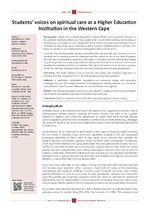| dc.contributor.author | Linda, Ntombizodwa S. | |
| dc.contributor.author | Klopper, Hester C. | |
| dc.contributor.author | Phetlhu, Deliwe R. | |
| dc.date.accessioned | 2017-08-31T12:37:03Z | |
| dc.date.available | 2017-08-31T12:37:03Z | |
| dc.date.issued | 2015 | |
| dc.identifier.citation | Linda, N. et al. (2015). ‘Students’ voices on spiritual care at a Higher Education Institution in the Western Cape. Curationis, 38(2): Art. #1520 | en_US |
| dc.identifier.issn | 0379-8577 | |
| dc.identifier.uri | http://dx.doi.org/10.4102/curationis.v38i2.1520 | |
| dc.identifier.uri | http://hdl.handle.net/10566/3166 | |
| dc.description.abstract | BACKGROUND: Nurses have a moral obligation to ensure holistic care of patients, inclusive of
the spiritual dimension. However, there seems to be a void in the teaching and learning of
spiritual care in nursing curricula. Despite the South African Nursing Council being in favour
of holistic nursing, there are no measures in place to ensure implementation of spiritual care,
hence its practice is not standardised in nursing education in South Africa.
Currently, the undergraduate nursing curriculum does not provide clear direction on how
spiritual care in nursing should be integrated and the reason for this is not clear. It appears
that the lack of professional regulation, difficulties in definition and the personalised nature
of spiritual practice are partly responsible for the practice being barely enforced and scarcely
practised by students in clinical placements. The aim of the study was to develop a practice
theory for teaching–learning of spiritual care in the undergraduate nursing programme.
OBJECTIVES: The study objective was to describe and explore the students’ experiences of
teaching–learning of spiritual care in the undergraduate nursing programme.
METHODS: A qualitative, explorative, descriptive and contextual design with purposive
sampling was used. The sample consisted of undergraduate nursing students at a University
in the Western Cape Province. Measures for trustworthiness were applied.
Results: The findings indicated a need to provide support, a conducive learning environment
and structure for teaching, learning and practice of spiritual care.
CONCLUSION: There is a need for formal education regarding spiritual care in nursing | en_US |
| dc.language.iso | en | en_US |
| dc.publisher | AOSIS | en_US |
| dc.rights | © 2015. The Authors.
Licensee: AOSIS
OpenJournals. This work is
licensed under the Creative
Commons Attribution
License. | |
| dc.subject | Students’ voices | en_US |
| dc.subject | Western Cape | en_US |
| dc.subject | Spiritual care | en_US |
| dc.subject | Higher education | en_US |
| dc.subject | Tertiary education | en_US |
| dc.title | Students’ voices on spiritual care at a Higher Education Institution in the Western Cape | en_US |
| dc.type | Article | en_US |

